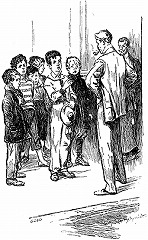“It’s the Baker Street division of the detective police force,” said my companion gravely; and as he spoke there rushed into the room half a dozen of the dirtiest and most ragged street Arabs that ever I clapped eyes on.
“’Tention!” cried Holmes, in a sharp tone, and the six dirty little scoundrels stood in a line like so many disreputable statuettes. “In future you shall send up Wiggins alone to report, and the rest of you must wait in the street. Have you found it, Wiggins?”

“No, sir, we hain’t,” said one of the youths.
“I hardly expected you would. You must keep on until you do. Here are your wages.” He handed each of them a shilling. “Now, off you go, and come back with a better report next time.”
He waved his hand, and they scampered away downstairs like so many rats, and we heard their shrill voices next moment in the street.
“There’s more work to be got out of one of those little beggars than out of a dozen of the force,” Holmes remarked. “The mere sight of an official-looking person seals men’s lips. These youngsters, however, go everywhere and hear everything. They are as sharp as needles, too; all they want is organization.”
“Is it on this Brixton case that you are employing them?” I asked.
“Yes; there is a point which I wish to ascertain. It is merely a matter of time. Hullo! we are going to hear some news now with a vengeance! Here is Gregson coming down the road with beatitude written upon every feature of his face. Bound for us, I know. Yes, he is stopping. There he is!”
There was a violent peal at the bell, and in a few seconds the fair-haired detective came up the stairs, three steps at a time, and burst into our sitting-room.
“My dear fellow,” he cried, wringing Holmes’s unresponsive hand, “congratulate me! I have made the whole thing as clear as day.”
A shade of anxiety seemed to me to cross my companion’s expressive face.
“Do you mean that you are on the right track?” he asked.
“The right track! Why, sir, we have the man under lock and key.”
“And his name is?”
“Arthur Charpentier, sub-lieutenant in Her Majesty’s navy,” cried Gregson pompously rubbing his fat hands and inflating his chest.
Sherlock Holmes gave a sigh of relief and relaxed into a smile.
“Take a seat, and try one of these cigars,” he said. “We are anxious to know how you managed it. Will you have some whisky and water?”
“I don’t mind if I do,” the detective answered. “The tremendous exertions which I have gone through during the last day or two have worn me out. Not so much bodily exertion, you understand, as the strain upon the mind. You will appreciate that, Mr. Sherlock Holmes, for we are both brain-workers.”
“You do me too much honour,” said Holmes, gravely. “Let us hear how you arrived at this most gratifying result.”
The detective seated himself in the armchair, and puffed complacently at his cigar. Then suddenly he slapped his thigh in a paroxysm of amusement.
“The fun of it is,” he cried, “that that fool Lestrade, who thinks himself so smart, has gone off upon the wrong track altogether. He is after the secretary Stangerson, who had no more to do with the crime than the babe unborn. I have no doubt that he has caught him by this time.”
The idea tickled Gregson so much that he laughed until he choked.
“And how did you get your clue?”